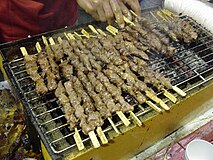Chuan (food)
This article needs additional citations for verification. (February 2013) |
| Part of a series of articles on |
| Chinese Islamic cuisine |
|---|
 |
| Dishes |


Chuan (Chinese: 串, Dungan: Чўан, pinyin: chuàn, "kebab/skewer"; Uyghur: كاۋاپ, кавап, "kawap"), especially in the north-east of China referred to as chuan'r (Chinese: 串儿), are small pieces of meat roasted on skewers.[1] Chuan originated in the Xinjiang region of China.[2] It has been spread throughout the rest of the country, most notably in Beijing, Tianjin, Jinan and Jilin, where it is a popular street food. It is a product of the Chinese Islamic cuisine of the Uyghur people and other Chinese Muslims.[3]
Overview
Chuan are small pieces of
In Tianjin and Jinan, chuan is often served with small round breads (馅饼, xiàn bǐng), also grilled with the same spices. Xiàn bǐng technically means "pie" or "filled bread". After cooking the bread and meat, the bread is split open and chuan meat is stuffed inside, then eaten together.
-
Barbecued chuan lamb sticks
-
Lamb skewers on automatic rotating grill, at a Chinese restaurant in Seoul, Korea
Controversy
In 2013, it was reported that the Beijing authorities were destroying open-air chuan barbecues in a bid to reduce pollution from small particles that can enter deep into the lungs. Hundreds of barbecues were reportedly confiscated over a three-month period, leading to ridicule from the local Beijing population.[5]
See also
References
- ^ ISBN 978-1-59884-955-4. Retrieved August 21, 2019.
- ^ ISBN 978-1-74321-664-4. Retrieved August 21, 2019.
- ^ Goldberg, Lina (22 February 2013). "Asia's 10 greatest street food cities". CNN Travel. Retrieved 24 February 2013.
- ^ Kauffman, Jonathan (September 14, 2015). "The Chinese street food that's showing up in local restaurants". San Francisco Chronicle.com. Retrieved August 21, 2019.
- ^ "Beijing Destroys Barbecue Grills To Cut Air Pollution, Sparking Criticism Among Citizens".


